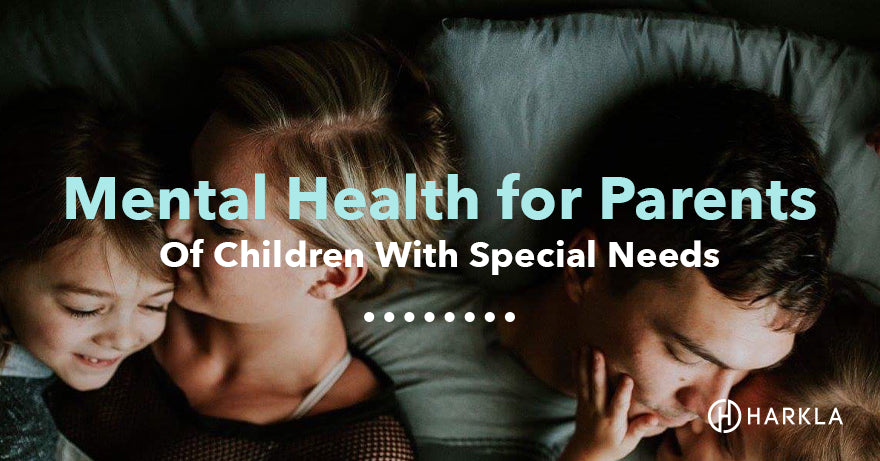Your Cart is Empty

Parenting is tough work. Parenting a child with special needs deserves its own gold medal.
After all, no amount of online research and over-preparation can prepare you for the inevitable curveballs that seemingly innocuous situations throw you.
You can’t pause life. But what you can do is take care of yourself to make sure you’re ready to react to whatever does happen.
Here are a few reminders – and tips! – that can help you take care of your mental health as the parent of a child with special needs.
Studies have found that parents of children with special needs disproportionately experience the following [2]:
Noting how often these, or other symptoms, tend to arise on a daily basis for you will help you determine the next steps in addressing your mental health.
“Self-care is typically the first thing to go for parents of children with special needs – and this only exacerbates stressful situations,” says Christine Grounds, LCSW, a therapist in New York City who works with parents of kids with special needs. Maintaining internal balance is crucial for fielding stress.
In addition to curveballs from external factors, you could already be experiencing internal anxiety or frustration on a daily basis. Therapy sets you up with healthy ways to cope with the various challenges you’re facing so that you can manage the amount of overwhelm you may feel on a daily basis.
Here are therapy types that may benefit you as a parent of a child with special needs:
Here’s how to find a therapist for your needs:
And at the end of the day, says Grounds, “Getting support will allow you to be a better parent.”
So you have your therapist lined up, and you can always fall back on your extended family and friends when you need them. While these things are crucial in maintaining optimal mental health, a support group can also be an invaluable source of shared strength.
Joining a support group allows you to:
One of the biggest stressors for parents of kids with special needs is feelings of isolation. It’s important to remember that you’re not alone. Finding support – whether virtual or in-person – can be invaluable as you connect with others who are facing similar situations.
Here are some good starting points:
Parents, and especially parents of children with special needs, are constantly on the go – and constantly making decisions regarding the well-being of their children.
To sharpen your focus, you may need to first quiet your mind. Doing so will allow you to be more present when crises do arise. Mindfulness exercises can be incredibly helpful in doing this. Try this exercise, which was designed for depression and anxiety:
Repeat as necessary, until you’ve reached a state of mind-body reconnection and balance.
It’s often said that we can’t pour from an empty cup. Taking the time to listen past the voice that’s telling you “it’s fine,” and replenish yourself as much as you’re realistically able, can make a world of difference in your parenting and everyday life.
This is a guest post from Zencare, a website that helps people find their ideal talk therapist. Visit Zencare.co to browse their vetted network of top therapists – using criteria like insurance, sliding scale, location, and specialties. You can also directly book a free assessment call from the Zencare site!
I could totally pay more attention to self-care, but it’s hard for me because I don’t have many options when it comes to having someone willing and able to watch my child while I focus on myself for a while. I’m grateful for whatever breaks I do get… Also, I’m very interested in finding suggestions on what to do if you have a spouse who is in denial about the diagnosis recieved by your special needs child.
We are a couple with 45-year autistic , non-speaking, low IQ, sometimes agresive child, who in the morning is custodied in institution, but all other time, including holidays, is with us. Patience, love and tolerance helps us in solving most problems. But sometimes, like these days, we feel so alone and desperate. Nobody can help us. The world sympatizes with loser, but applauses to winner.
Thank you for sharing this much-needed information and advice! This is a very important topic.
Comments will be approved before showing up.



Audrey Dahlke
June 30, 2023
I have a 32 year old son, with TBA ..His caseworker has not really done anything to help in the last 4 years. Jake, my son…was engaged to be married, but his ex fiance cheated on him…so that relationship has been over now for about a year. Since then, he has been very deoressed, also, he does not have many friends ..and he always wants me to do things with him. I sometimes di, but probably not enough, as I have my own health issues, and just like quiet time…I feel really guilty about that . Is it normal to feel this way? I love him to death, but just want time to myself, which he doesn’t understand. How can I communicate better with him?